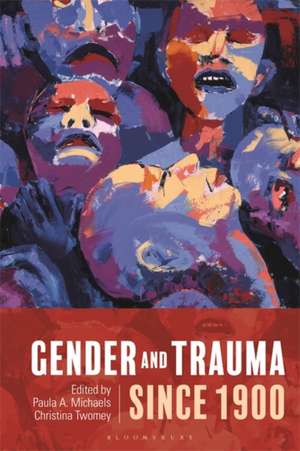Gender and Trauma since 1900
Editat de Paula A. Michaels, Christina Twomeyen Limba Engleză Paperback – 7 apr 2021
| Toate formatele și edițiile | Preț | Express |
|---|---|---|
| Paperback (1) | 181.01 lei 3-5 săpt. | |
| Bloomsbury Publishing – 7 apr 2021 | 181.01 lei 3-5 săpt. | |
| Hardback (1) | 511.97 lei 6-8 săpt. | |
| Bloomsbury Publishing – 7 apr 2021 | 511.97 lei 6-8 săpt. |
Preț: 181.01 lei
Preț vechi: 220.97 lei
-18% Nou
Puncte Express: 272
Preț estimativ în valută:
34.64€ • 35.96$ • 28.88£
34.64€ • 35.96$ • 28.88£
Carte disponibilă
Livrare economică 04-18 martie
Preluare comenzi: 021 569.72.76
Specificații
ISBN-13: 9781350145351
ISBN-10: 1350145351
Pagini: 296
Ilustrații: 2 bw illus
Dimensiuni: 156 x 234 x 22 mm
Greutate: 0.46 kg
Editura: Bloomsbury Publishing
Colecția Bloomsbury Academic
Locul publicării:London, United Kingdom
ISBN-10: 1350145351
Pagini: 296
Ilustrații: 2 bw illus
Dimensiuni: 156 x 234 x 22 mm
Greutate: 0.46 kg
Editura: Bloomsbury Publishing
Colecția Bloomsbury Academic
Locul publicării:London, United Kingdom
Caracteristici
Analyses the interplay of gender and trauma through eleven case studies across North America, Europe and the Asia-Pacific
Notă biografică
Paula A. Michaels is Associate Professor of History at Monash University, Australia. Her work bridges the histories of Eastern and Western Europe, integrating the USSR into a pan-European and global narrative through the study of social and cultural history. She is especially interested in the ways that medicine is mobilised to further political and social objectives. Christina Twomey is Professor of History and current Head of the School of Philosophical, Historical and International Studies at Monash University, Australia. Her research focuses on histories of humanitarianism and the cultural history of war, with a particular interest in imprisonment and internment, and the photography of atrocity.
Cuprins
List of IllustrationsNotes on ContributorsAcknowledgements 1. Gender and Trauma since 1900. Paula A. Michaels and Christina Twomey, 2. Trauma in Post-WWI Italy: Experiences, Erasures, and Denials. Martina Salvante3. Trauma, child refugees, and humanitarians in the Spanish Civil War and World War II: A Case Study of Esme Odgers. Joy Damousi 4. Servitude, Displacement, and Trauma: Jewish Refugee Domestics in Great Britain 1938-45. Jennifer Craig-Norton 5. 'Combat Exhaustion' vs. 'Psychoneurosis': American Psychiatrists and the Terminology of War Trauma during World War II. Rebecca Jo Plant6. POWs into Citizens: Repatriation, Gender and the Civilian Resettlement Units in Great Britain. Elizabeth Roberts-Pedersen 7. Soviet Maternity Care and Competing Narratives of Trauma. Paula A. Michaels8. Trauma and sexual violence: narratives and cases in late-twentieth century Australia. Lisa Featherstone 9. Psychological, Embodied and Gendered Trauma in Militarized Kampala (Uganda). Benjamin Twagira 10. 'The Missing Ones': Vietnamese Diasporic Memory and Women's Narratives of Loss. Nathalie Huynh Chau Nguyen 11. Refiguring 'Trauma': Women's Narratives of Suffering in Post-Conflict Timor-Leste. Hannah Loney 12. Changing the Story: women and trauma in Australian narratives of mental illness. Katie Holmes Consolidated BibliographyIndex
Recenzii
This book transforms our understanding of the history of psychological trauma. By placing gender at the centre of its inquiry, this powerful study probes the traumatic dimensions of war, survival, displacement, sexual violence, childbirth, and mental illness. Tracking the gender lines of trauma and its socio-cultural history, the essays in this volume offer some of the most innovative considerations of emotional and mental distress, traumatic memory and the long term, devastating, impacts of war and sexual violence. In doing so, these scholars collectively disrupt the dominant and linear master narrative, which has considered trauma as a masculine journey travelled through war, from the shell shock of World War I through the neurosis of World War II, to the discovery of Post-Traumatic Stress Disorder post the Vietnam War. In this book, trauma is neither linear, gender normative, nor geographically contingent, rather it is a complex fluid phenomenon with collective and personal dimensions that intersect with gender, power, place and time
